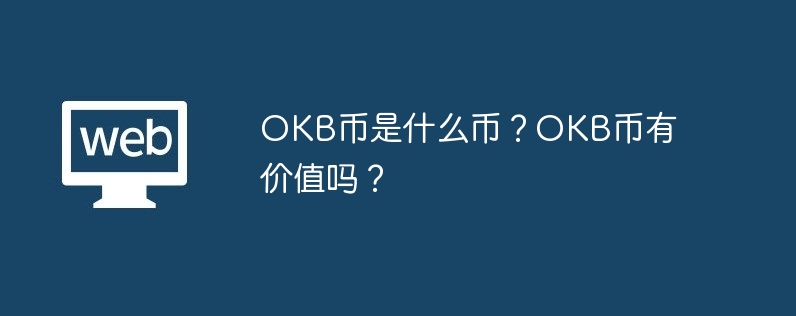What is OKB coin? Is OKB coin valuable?
- 王林Original
- 2024-02-27 20:25:341021browse

What is OKB coin? Is OKB coin valuable?
Introduction to OKB Coin
OKB Coin is a platform currency issued by OKX Exchange, with a total amount of 1 billion, and was issued on June 6, 2017. The full English name of OKB coin is OKB Token, which is an ERC-20 token based on the Ethereum blockchain.
Main uses of OKB coins
- Transaction fee reduction: OKB coin holders can enjoy transaction fee reduction when trading on OKX exchange. The greater the holding, the higher the reduction ratio.
- Participate in IEO: OKX exchange will hold IEO regularly, and OKB coin holders can participate in the subscription first.
- Mortgage lending: OKB coins can be mortgaged and borrowed on the OKX exchange.
- Voting Governance: OKB coin holders can participate in the governance voting of OKX Exchange and vote on the development direction and major decisions of the platform.
The development prospects of OKB currency
The development prospects of OKB currency are mainly affected by the OKX exchange. As one of the world's top cryptocurrency exchanges, OKX Exchange has a large user base and a good reputation. As long as OKX maintains good growth momentum, the demand for OKB coins will increase, thus supporting the stability of the currency price. As OKX continues to expand and innovate in the market, OKB Coin will have more opportunities to stand out in the cryptocurrency industry. Investors' confidence in OKB coin will also increase, laying the foundation for its future development. Therefore, the development of OKX exchange plays a crucial role in the value and market performance of OKB coin.
In addition, the buyback and destruction mechanism of OKB coins provides stability to its price. According to the OKX exchange’s plan, half of the total supply, or 500 million OKB coins, will be destroyed by 2025. This move will help reduce the circulation of OKB coins, thereby keeping the currency price at a relatively high level. This destruction mechanism not only helps to increase investor confidence, but also lays the foundation for the long-term appreciation of OKB coins. Due to the reduction in supply, the market demand for OKB Coin may increase, thereby promoting its
OKB Coin Market Recognition
OKB Coin is one of the platform coins with higher market recognition. In CoinMarketCap’s platform currency rankings, OKB coin ranks high.
Is OKB coin valuable?
Whether OKB coins have value depends on the individual judgment of investors. From the perspective of OKB coin’s usage, development prospects and market recognition, OKB coin has a certain value. However, the cryptocurrency market is highly volatile and investment involves risks. Investors should carefully evaluate before investing.
The above is the detailed content of What is OKB coin? Is OKB coin valuable?. For more information, please follow other related articles on the PHP Chinese website!
Related articles
See more- Practical Notes on Blockchain Technology: Sharing Go Language Development Experience
- Getting Started Guide to Blockchain Development (Go Language Edition)
- What are the top five domestic digital currency exchanges? List of the top five digital currency exchanges
- Why can't I access the Ethereum browser?
- Will Ethereum surge in 2024?

